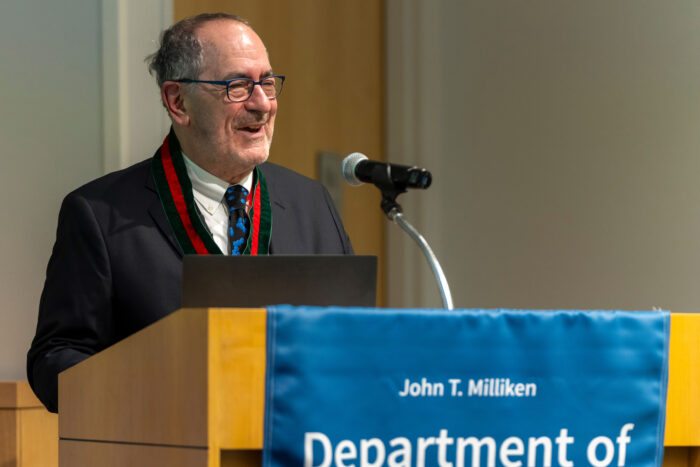Weil installed as Medoff professor
Recognized for helping reduce global burden of parasitic worm diseases

Gary Weil, MD, has been named the inaugural Gerald and Judith Medoff Professor of Infectious Diseases at Washington University School of Medicine in St. Louis. Weil received the honor in recognition of his efforts to eliminate parasitic worm diseases as global public health threats.
Gary J. Weil, MD, an infectious diseases physician-scientist whose work has helped reduce the global burden of parasitic worm diseases, has been named the inaugural Gerald and Judith Medoff Professor of Infectious Diseases at Washington University School of Medicine in St. Louis.
The professorship was established by the Department of Medicine — with the support of more than 80 alumni, faculty and friends of the department — in honor of Gerald Medoff, MD, the first infectious diseases specialist and founding director of the Division of Infectious Diseases in the Department of Medicine, and his wife, Judith Medoff, PhD. Gerald Medoff died in 2019, and Judith Medoff died in 2022.
“In establishing this professorship, we pay tribute to a remarkable physician-scientist,” said Chancellor Andrew D. Martin. “Jerry Medoff played an integral role in establishing Washington University School of Medicine as a leader in the field of infectious diseases. His legacy lives on in this professorship, which will support cutting-edge research in infectious diseases for many years to come. I’m pleased that Gary Weil will be the inaugural recipient.”
A professor of medicine and of molecular microbiology, Weil founded and serves as co-director of the Death to Onchocerciasis and Lymphatic Filariasis (DOLF) Project funded by the Bill & Melinda Gates Foundation. The DOLF Project performs research aimed at advancing global efforts to eliminate parasitic worm diseases as public health threats, primarily onchocerciasis, also known as river blindness; and lymphatic filariasis, also known as elephantiasis. Both infections are transmitted by biting insects. Onchocerciasis causes severe chronic skin disease and blindness, and lymphatic filariasis causes disabling swelling in the legs.
“Jerry Medoff built the Division of Infectious Diseases from the ground up and turned it into a nationally renowned hub for innovative care and research,” said David H. Perlmutter, MD, the George and Carol Bauer Dean of Washington University School of Medicine, executive vice chancellor for medical affairs, and the Spencer T. and Ann W. Olin Distinguished Professor. “His commitment to providing high-quality care to all is embodied in Gary Weil, who has devoted his career to reducing the burden of disease on people in some of the most remote parts of the world.”
Weil’s research has improved diagnosis and treatment of parasitic worm diseases that affect millions of people in the developing world. He developed a diagnostic test that has become a critical component of the global program to eliminate lymphatic filariasis. His research on the effectiveness of a triple-drug therapy for lymphatic filariasis elimination led the World Health Organization to recommend changes to mass treatment regimens. Weil has contributed to global efforts to eliminate lymphatic filariasis that resulted in a 74% decrease in the number of people infected between 1997 and 2022. He continues to work with others to identify and test improved treatments for these and other neglected diseases caused by parasitic worms.
“Gary has dedicated his career to serving the underserved,” said Victoria J. Fraser, MD, the Adolphus Busch Professor and head of the John T. Milliken Department of Medicine. “His work has had a profound impact on millions of people around the world. I can’t think of anyone more deserving of this professorship than Gary.”
Weil earned his undergraduate degree at Harvard College and his medical degree at Harvard Medical School. He completed a residency in internal medicine at Yale New Haven Hospital and a research fellowship in parasitology at the National Institutes of Health (NIH) before coming to Washington University School of Medicine for a clinical fellowship in infectious diseases with Medoff.
“Gary has made indelible contributions to global public health,” said William G. Powderly, MD, the J. William Campbell Professor of Medicine and co-director of the Division of Infectious Diseases. “He has conducted important research at all levels, from studying the basic biology of parasitic worm infections, to developing diagnostic methods, to launching complex programs to deliver life-altering and lifesaving treatment in resource-limited settings. He is a true leader in infectious diseases.”
Medoff earned his medical degree at Washington University. He left St. Louis for a residency in Boston and joined the faculty at Harvard for a time before returning to Washington University as a faculty member in 1970. An expert in how antifungal agents work and how fungi resist them, he was one of the original leaders of the Mycosis Study Group, an NIH-funded national network established in 1978 to find treatments and preventives for invasive fungal infections. In 1972, he became the first director of the Division of Infectious Diseases. He served for two decades, building the division into a national leader in clinical care and research. In 1992, he stepped down to become vice chair of clinical affairs in the Department of Medicine.
Judith Medoff earned her bachelor’s degree from Barnard College and her doctorate in biology from Brandeis University, where she studied embryology. As a postdoctoral fellow at Washington University, she worked with Nobel Prize winner Rita Levi-Montalcini, PhD, in what was then the Department of Zoology. She served on the faculty at Saint Louis University for over 30 years, retiring as a tenured professor. She and Gerald Medoff were married for 58 years.






